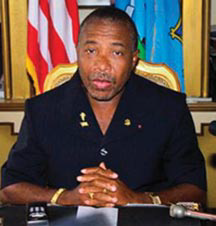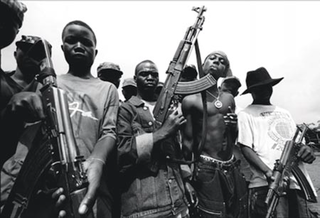
Liberia is a country in West Africa founded by free people of color from the United States. The emigration of African Americans, both freeborn and recently emancipated, was funded and organized by the American Colonization Society (ACS). The mortality rate of these settlers was the highest among settlements reported with modern recordkeeping. Of the 4,571 emigrants who arrived in Liberia between 1820 and 1843, only 1,819 survived (39.8%).

Charles McArthur Ghankay Taylor is a Liberian former politician and convicted war criminal who served as the 22nd president of Liberia from 2 August 1997 until his resignation on 11 August 2003 as a result of the Second Liberian Civil War and growing international pressure.

Samuel Kanyon Doe was a Liberian politician who served as the 21st president of Liberia from 1986 to 1990. He ruled Liberia as Chairman of the People's Redemption Council (PRC) from 1980 to 1986 and then as president from 1986 to 1990.
Prince Yormie Johnson is a Liberian politician and one of the current Senators from Nimba County. A former rebel leader, Johnson played a prominent role in the First Liberian Civil War. Serving as leader of the Independent National Patriotic Front of Liberia, he captured, tortured and executed President Samuel Doe, who had himself overthrown and murdered the previous president William R. Tolbert Jr.

The First Liberian Civil War was the first in a series of two civil wars within the West African nation of Liberia. It lasted from 1989 to 1997. President Samuel Doe established a regime in 1980 but totalitarianism and corruption led to unpopularity and the withdrawal of support from the United States by the late 1980s. The National Patriotic Front of Liberia (NPFL) led by Charles Taylor invaded Liberia from the Ivory Coast to overthrow Doe in December 1989 and gained control over most of the country within a year. Doe was captured and executed by the Independent National Patriotic Front of Liberia (INPFL), a splinter faction of the NPFL led by Prince Johnson, in September 1990. The NPFL and INPFL fought each other for control of the capital city, Monrovia and against the Armed Forces of Liberia and pro-Doe United Liberation Movement of Liberia for Democracy. Peace negotiations and foreign involvement led to a ceasefire in 1995 but fighting continued until a peace agreement between the main factions occurred in August 1996. Taylor was elected President of Liberia following the 1997 Liberian general election and entered office in August of the same year.

The Second Liberian Civil War was a civil war in the West African nation of Liberia that lasted from 1999 to 2003.

General elections were held in Liberia on 19 July 1997 as part of the 1996 peace agreement ending the First Liberian Civil War. The presidency, as well as all seats in the House of Representatives and the Senate were up for election. Voter turnout was around 89%. Former rebel leader Charles Taylor and his National Patriotic Party (NPP) won the election with 75.3% of the vote, giving it about three-quarters of the legislative seats according to the proportional representation system. Taylor was inaugurated as president on 2 August 1997.
The National Patriotic Front of Liberia (NPFL) was a Liberian rebel group that initiated and participated in the First Liberian Civil War from 24 December 1989 – 2 August 1997. The NPFL emerged out of rising ethnic tensions and civil unrest due to the Liberian government that was characterized by totalitarianism, corruption, and favoritism towards ethnic Krahns. The NPFL invaded Liberia through Ivory Coast’s border with Nimba County in Liberia under the direction of Charles Taylor, a former Liberian politician and guerrilla leader who served as the 22nd president of Liberia from 2 August 1997 until his resignation on 11 August 2003.
Momolu V. Sackor Sirleaf was a Liberian politician. During the First Liberian Civil War, he represented the National Patriotic Front of Liberia internationally. He served as foreign minister of the National Patriotic Reconstruction Assembly Government of Charles Taylor in 1993. He represented the NPFL in the 1993 Geneva talks that followed the Harper massacre.
The Hon. Lewis G. Brown II is former Minister for Information, Cultural Affairs and Tourism in Liberia. After serving as minister of Information Cultural Affairs and Tourism, Lewis Garseedah Brown II was appointed by President Sirleaf as Liberia's permanent Ambassador at The United Nations and Liberia's Ambassador Extraordinary and Plenipotentiary at the Republic of Cuba in 2016. He's also the chairman of all ECOWAS's Ambassadors at UN. Amb. Brown also served as National Security Advisor to Charles Taylor and also Managing Director of LPRC.
Joshua Milton Blahyi, better known by his nom de guerre General Butt Naked, is a Liberian evangelical preacher, writer and former warlord best known for his actions during the First Liberian Civil War. During the conflict, Blahyi led a group of soldiers which fought on the side of rebel group United Liberation Movement of Liberia for Democracy (ULIMO) before converting to Christianity and becoming a pastor in 1996.
The Iron Ladies of Liberia (2007) is an independently produced documentary film that gives behind-the-scenes access to President Ellen Johnson Sirleaf's first year in government. Johnson-Sirleaf is Africa's first female president.

Jucontee Thomas Woewiyu, also known as Tom Woewiyu or Thomas Smith, was the former leader of the National Patriotic Front of Liberia (NPFL), with Charles Taylor.
Dorothy Harriet Eugenia Musuleng Cooper was a Liberian educator, politician and the first woman to serve as Foreign Minister in Liberia. She was born at Arthington, Liberia and obtained her B.S. and M.S. from College of West Africa and San Francisco State University respectively. She worked as a school teacher between graduation and high school and matriculation in 1964 in San Francisco in 1964, curriculum development in the Ministry of Education, and principal of Cuttington University College. She was an education minister in Charles Taylor's shadow government from 1990 to 1993 in the National Patriotic Reconstruction Assembly Government
The Press Union of Liberia was founded on September 30, 1964, by a group of independent journalists. It serves as an umbrella organization for media professionals and institutions to advocate for press freedom and the legal protection of journalists.
Grace Beatrice Minor is an Americo-Liberian politician who served as the first female President Pro Tempore of the Senate from 2002 to 2003. She was senator for Montserrado County. Minor was a close ally of president Charles Taylor.
Benjamin Yeaten, widely known by his old radio call sign "50", is a Liberian militia leader and mercenary, who served as the Armed Forces of Liberia's deputy commander and director of the Special Security Service (SSS) during the presidency of Charles Taylor. Notorious for committing several war crimes, Yeaten was one of Taylor's most trusted and loyal followers. He rose to the de facto leader of all of Taylor's armed forces and the second most powerful figure in the government during the Second Liberian Civil War. After the fall of Taylor's regime, he managed to flee his home country, and since then operates covertly in West Africa as commander, recruiter, and military adviser for hire.
Hassan Bility is a Liberian journalist, and the founder and Director of the Global Justice and Research Project (GJRP), a non-governmental organization dedicated to the documentation of war time atrocities in Liberia and to assisting victims in their pursuit of justice for these crimes.

The Liberia national transitional government was a provisional government, or rather the name given to three successive governments, in Liberia formed in the midst of the First Liberian Civil War. The LNTG was product of the July 25, 1993, Cotonou Peace Accord, whereby the Interim Government of National Unity disbanded. The respective LNTG-I, LNTG-II and LNTG-III governments were differentiated by being led by three different chairpersons. Initially supposed to last for six months to allow for disarmament of warring factions and preparations of national elections, the LNTG timeline lasted until mid-1997. Various of the warring factions had direct participation in the LNTG and civilian elements were gradually sidelined. Through participation in the provisional governance of LNTG the different warlords could gain access to state resources, even in situations when armed hostilities continued. The LNTG period ended with the 1997 Liberian general election whereby Charles Taylor was elected President of Liberia.
Joseph W. Mulbah (1956–2011) was a Liberian journalist and politician. He served as Minister of Information, Culture and Tourism and Minister of Transport.







